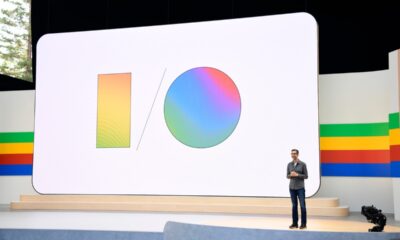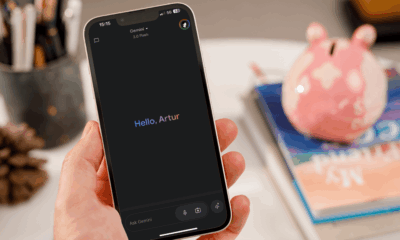Tech News
AnyChat brings together ChatGPT, Google Gemini, and more for ultimate AI flexibility

Join our daily and weekly newsletters for the latest updates and exclusive content on industry-leading AI coverage. Learn More
A new tool called AnyChat is providing developers with unprecedented flexibility by bringing together a variety of top large language models (LLMs) under a single interface.
Created by Ahsen Khaliq (also known as “AK”), a prominent figure in the AI community and machine learning growth lead at Gradio, the platform enables users to seamlessly switch between models like ChatGPT, Google’s Gemini, Perplexity, Claude, Meta’s LLaMA, and Grok, without being tied to a single provider. AnyChat aims to revolutionize how developers and businesses engage with artificial intelligence by offering a comprehensive solution for accessing multiple AI systems.
At its essence, AnyChat is designed to simplify the process for developers to experiment with and deploy different LLMs without the constraints of traditional platforms. “We wanted to create something that gives users complete control over which models they can utilize,” said Khaliq. “Instead of being limited to a single provider, AnyChat gives you the freedom to incorporate models from various sources, whether it’s a proprietary model like Google’s Gemini or an open-source option from Hugging Face.”
Khaliq’s innovation is built on Gradio, a popular framework for developing customizable AI applications. The platform features a tab-based interface for easy model switching, along with dropdown menus for selecting specific versions of each AI. AnyChat also supports token authentication to ensure secure API access for enterprise users. For models that require paid API keys, developers can input their credentials, while others, like basic Gemini models, are accessible without an API key thanks to a free key provided by Khaliq.
How AnyChat fills a critical gap in AI development
The introduction of AnyChat comes at a pivotal moment for the AI industry. As companies increasingly integrate AI into their operations, many have encountered challenges due to the limitations of individual platforms. Currently, most developers must choose between committing to a single model, such as OpenAI’s GPT-4o, or investing significant time and resources in integrating multiple models separately. AnyChat addresses this issue by providing a unified interface capable of handling both proprietary and open-source models, offering developers the flexibility to select the best tool for the task at hand.
This flexibility has already captured the interest of the developer community. In a recent update, a contributor added support for DeepSeek V2.5, a specialized model available through the Hyperbolic API, demonstrating how easily new models can be integrated into the platform. “The true power of AnyChat lies in its potential for growth,” said Khaliq. “The community can expand it with new models, making the platform’s possibilities far greater than any single model alone.”
What makes AnyChat useful for teams and companies
For developers, AnyChat offers a streamlined solution to what has historically been a complex and time-consuming process. Instead of building separate infrastructure for each model or being bound to a single AI provider, users can deploy multiple models within the same application. This is particularly beneficial for enterprises that may require different models for various tasks—for example, an organization could utilize ChatGPT for customer support, Gemini for research and search capabilities, and Meta’s LLaMA for vision-based tasks, all within a unified interface.
The platform also boasts real-time search and multimodal capabilities, making it a versatile tool for more intricate use cases. Perplexity models integrated into AnyChat offer real-time search functionality, a feature highly valued by enterprises seeking to stay abreast of constantly evolving information. Conversely, models like LLaMA 3.2 provide vision support, expanding the platform’s capabilities beyond text-based AI.
Khaliq highlighted one of AnyChat’s key advantages as its support for open-source models. “We wanted to ensure that developers who prefer working with open-source models have equal access to those using proprietary systems,” he stated. AnyChat accommodates a wide range of models hosted on Hugging Face, a popular platform for open-source AI implementations. This grants developers greater control over their deployments and enables them to sidestep the costly API fees associated with proprietary models.
How AnyChat handles both text and image processing
One of the most exciting features of AnyChat is its support for multimodal AI, allowing models to process both text and images. This capability is increasingly essential as companies seek AI systems capable of handling more complex tasks, from analyzing images for diagnostic purposes to deriving text-based insights from visual data. Models like LLaMA 3.2, which includes vision support, are pivotal in meeting these requirements, and AnyChat simplifies the transition between text-based and multimodal models as needed.
For many enterprises, this flexibility represents a significant advantage. Instead of investing in separate systems for text and image analysis, they can now implement a single platform that caters to both. This can lead to substantial cost savings and expedited development times for AI-driven projects.
AnyChat’s growing library of AI models
AnyChat’s potential extends beyond its current capabilities. Khaliq envisions that the platform’s open architecture will encourage more developers to contribute models, making it an even more robust tool over time. “The beauty of AnyChat is that it doesn’t just stop at what’s available now. It’s designed to grow with the community, ensuring that the platform remains at the forefront of AI development,” he shared with VentureBeat.
The community has embraced this vision. In discussions on Hugging Face, developers have noted the ease of adding new models to the platform. With support for models like DeepSeek V2.5 already being integrated, AnyChat is poised to become a hub for AI experimentation and deployment.
What’s next for AnyChat and AI development
As the AI landscape evolves, tools like AnyChat will play a pivotal role in shaping how developers and enterprises engage with AI technology. By providing a unified interface for multiple models and enabling seamless integration of both proprietary and open-source systems, AnyChat is breaking down the barriers that have traditionally separated different AI platforms.
For developers, it offers the freedom to select the best tool for the job without the complexities of managing multiple systems. For enterprises, it delivers a cost-effective, scalable solution that can evolve alongside their AI requirements. With the addition of more models and ongoing platform enhancements, AnyChat could emerge as the go-to tool for leveraging the full potential of large language models in applications.
-

 Destination8 months ago
Destination8 months agoSingapore Airlines CEO set to join board of Air India, BA News, BA
-

 Breaking News9 months ago
Breaking News9 months agoCroatia to reintroduce compulsory military draft as regional tensions soar
-

 Tech News12 months ago
Tech News12 months agoBangladeshi police agents accused of selling citizens’ personal information on Telegram
-

 Gadgets3 months ago
Gadgets3 months agoSupernatural Season 16 Revival News, Cast, Plot and Release Date
-

 Productivity11 months ago
Productivity11 months agoHow Your Contact Center Can Become A Customer Engagement Center
-

 Breaking News9 months ago
Breaking News9 months agoBangladesh crisis: Refaat Ahmed sworn in as Bangladesh’s new chief justice
-

 Gadgets1 week ago
Gadgets1 week agoFallout Season 2 Potential Release Date, Cast, Plot and News
-

 Toys11 months ago
Toys11 months ago15 of the Best Trike & Tricycles Mums Recommend

















